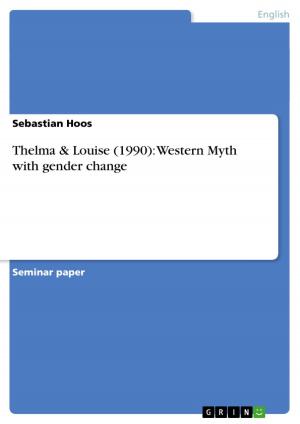Compulsory Domesticity? - Comparing gender notions of Jean-Jacques Rousseau and John Stuart Mill in 'Émile' and 'The Subjection of Women'
Comparing gender notions of Jean-Jacques Rousseau and John Stuart Mill in 'Émile' and 'The Subjection of Women'
Fiction & Literature, Literary Theory & Criticism| Author: | Bert Bobock | ISBN: | 9783638065825 |
| Publisher: | GRIN Publishing | Publication: | June 19, 2008 |
| Imprint: | GRIN Publishing | Language: | English |
| Author: | Bert Bobock |
| ISBN: | 9783638065825 |
| Publisher: | GRIN Publishing |
| Publication: | June 19, 2008 |
| Imprint: | GRIN Publishing |
| Language: | English |
Seminar paper from the year 2005 in the subject Literature - Comparative Literature, grade: 1,0, Brown University (Department of History), course: European Intellectual History: Discovering the Modern, 12 entries in the bibliography, language: English, abstract: Although political philosophers like Jean-Jacques Rousseau, John Locke and Thomas Hobbes thought it important that all individuals be free to govern themselves, they often based their theories of representative democracy on the nuclear family as the smallest unit in society. Since families are formed by individuals, how is it possible that these thinkers dismissed the voice of one half of the population - women? This essay examines how gender notions shifted in the century between the publication of Rousseau's Émile in 1762 and Mill's 'The Subjection of Women' in 1869. How can Rousseau's general desire for equality and freedom of the individual be combined with his claim that women need to be complementary and serviceable to men? How does Mill's concept of domesticity and his assumption that women would prefer the domestic realm, when given the choice between having a career or creating a home, relate to Rousseau's ideas of domesticity?
https://www.linkedin.com/in/bertbobock
Seminar paper from the year 2005 in the subject Literature - Comparative Literature, grade: 1,0, Brown University (Department of History), course: European Intellectual History: Discovering the Modern, 12 entries in the bibliography, language: English, abstract: Although political philosophers like Jean-Jacques Rousseau, John Locke and Thomas Hobbes thought it important that all individuals be free to govern themselves, they often based their theories of representative democracy on the nuclear family as the smallest unit in society. Since families are formed by individuals, how is it possible that these thinkers dismissed the voice of one half of the population - women? This essay examines how gender notions shifted in the century between the publication of Rousseau's Émile in 1762 and Mill's 'The Subjection of Women' in 1869. How can Rousseau's general desire for equality and freedom of the individual be combined with his claim that women need to be complementary and serviceable to men? How does Mill's concept of domesticity and his assumption that women would prefer the domestic realm, when given the choice between having a career or creating a home, relate to Rousseau's ideas of domesticity?
https://www.linkedin.com/in/bertbobock















